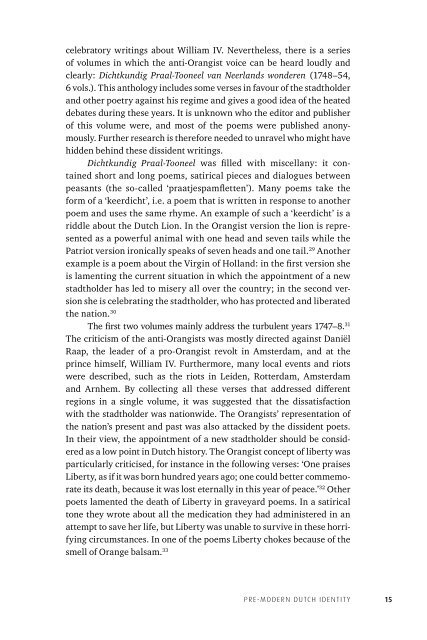Discord Consensus
7aze300jFJo
7aze300jFJo
Create successful ePaper yourself
Turn your PDF publications into a flip-book with our unique Google optimized e-Paper software.
celebratory writings about William IV. Nevertheless, there is a series<br />
of volumes in which the anti-Orangist voice can be heard loudly and<br />
clearly: Dichtkundig Praal-Tooneel van Neerlands wonderen (1748–54,<br />
6 vols.). This anthology includes some verses in favour of the stadtholder<br />
and other poetry against his regime and gives a good idea of the heated<br />
debates during these years. It is unknown who the editor and publisher<br />
of this volume were, and most of the poems were published anonymously.<br />
Further research is therefore needed to unravel who might have<br />
hidden behind these dissident writings.<br />
Dichtkundig Praal-Tooneel was filled with miscellany: it contained<br />
short and long poems, satirical pieces and dialogues between<br />
peasants (the so-called ‘praatjespamfletten’). Many poems take the<br />
form of a ‘keerdicht’, i.e. a poem that is written in response to another<br />
poem and uses the same rhyme. An example of such a ‘keerdicht’ is a<br />
riddle about the Dutch Lion. In the Orangist version the lion is represented<br />
as a powerful animal with one head and seven tails while the<br />
Patriot version ironically speaks of seven heads and one tail. 29 Another<br />
example is a poem about the Virgin of Holland: in the first version she<br />
is lamenting the current situation in which the appointment of a new<br />
stadtholder has led to misery all over the country; in the second version<br />
she is celebrating the stadtholder, who has protected and liberated<br />
the nation. 30<br />
The first two volumes mainly address the turbulent years 1747–8. 31<br />
The criticism of the anti-Orangists was mostly directed against Daniël<br />
Raap, the leader of a pro-Orangist revolt in Amsterdam, and at the<br />
prince himself, William IV. Furthermore, many local events and riots<br />
were described, such as the riots in Leiden, Rotterdam, Amsterdam<br />
and Arnhem. By collecting all these verses that addressed different<br />
regions in a single volume, it was suggested that the dissatisfaction<br />
with the stadtholder was nationwide. The Orangists’ representation of<br />
the nation’s present and past was also attacked by the dissident poets.<br />
In their view, the appointment of a new stadtholder should be considered<br />
as a low point in Dutch history. The Orangist concept of liberty was<br />
particularly criticised, for instance in the following verses: ‘One praises<br />
Liberty, as if it was born hundred years ago; one could better commemorate<br />
its death, because it was lost eternally in this year of peace.’ 32 Other<br />
poets lamented the death of Liberty in graveyard poems. In a satirical<br />
tone they wrote about all the medication they had administered in an<br />
attempt to save her life, but Liberty was unable to survive in these horrifying<br />
circumstances. In one of the poems Liberty chokes because of the<br />
smell of Orange balsam. 33<br />
Pre-modern Dutch identity 15


